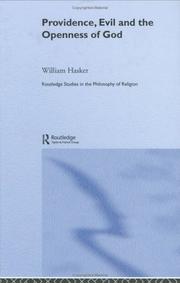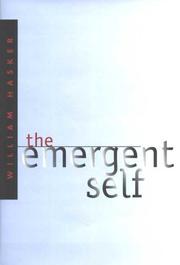| Listing 1 - 10 of 16 | << page >> |
Sort by
|
Book
ISBN: 0801422418 Year: 1989 Volume: vol *3 Publisher: Ithaca (N.Y.): Cornell university press
Abstract | Keywords | Export | Availability | Bookmark
 Loading...
Loading...Choose an application
- Reference Manager
- EndNote
- RefWorks (Direct export to RefWorks)
Compatibilism --- Determinism and free will --- Determinism and indeterminism --- Determinisme en indeterminisme --- Déterminisme et indéterminisme --- Free agency --- Free will and determinism --- Freedom and determinism --- Freedom of the will --- Indeterminism --- Indeterminisme --- Liberty of the will --- Libre arbitre et déterminisme --- Temps (Theologie) --- Tijd (Theologie) --- Time (Theology) --- Vrije wil --- Vrije wil en determinisme --- Vrijheid van de wil --- Wilsvrijheid --- God --- -Time --- -Hours (Time) --- Geodetic astronomy --- Nautical astronomy --- Horology --- Metaphysics --- Misotheism --- Monotheism --- Religion --- Theism --- Determinism (Philosophy) --- Omniscience --- Religious aspects --- -Christianity --- -Omniscience --- God - Omniscience. --- Free will and determinism. --- Time - Religious aspects - Christianity. --- God (Christianity) --- Time --- Hours (Time) --- Knowledge of God (Omniscience of God) --- Religious aspects&delete& --- Christianity --- Knowledge (Omniscience) --- Omniscience (Theory of knowledge) --- Attributes

ISBN: 0415329493 Year: 2004 Volume: 3 Publisher: London Routledge
Abstract | Keywords | Export | Availability | Bookmark
 Loading...
Loading...Choose an application
- Reference Manager
- EndNote
- RefWorks (Direct export to RefWorks)
Free-will theism --- God [Open view of ] --- God [Openness of ] --- Neotheism --- Open theism --- Open theïsme --- Open view of God --- Openness of God --- Openness theology --- Theism [Open ] --- Théisme ouvert --- God, Open view of --- God, Openness of --- Theism, Open --- Theology, Doctrinal

ISBN: 1501702874 1501702882 9781501702877 0801436524 9781501702884 Year: 2015 Publisher: Ithaca, NY
Abstract | Keywords | Export | Availability | Bookmark
 Loading...
Loading...Choose an application
- Reference Manager
- EndNote
- RefWorks (Direct export to RefWorks)
In The Emergent Self, William Hasker joins one of the most heated debates in analytic philosophy, that over the nature of mind. His provocative and clearly written book challenges physicalist views of human mental functioning and advances the concept of mind as an emergent individual. Hasker begins by mounting a compelling critique of the dominant paradigm in philosophy of mind, showing that contemporary forms of materialism are seriously deficient in confronting crucial aspects of experience. He further holds that popular attempts to explain the workings of mind in terms of mechanistic physics cannot succeed. He then criticizes the two versions of substance dualism most widely accepted today-Cartesian and Thomistic-and presents his own theory of emergent dualism. Unlike traditional substance dualisms, Hasker's theory recognizes the critical role of the brain and nervous system for mental processes. It also avoids the mechanistic reductionism characteristic of recent materialism. Hasker concludes by addressing the topic of survival following bodily death. After demonstrating the failure of materialist views to offer a plausible and coherent account of that possibility, he considers the implications of emergentism for notions of resurrection and the afterlife.
Mind and body. --- Philosophy of mind. --- Body and mind --- Body and soul (Philosophy) --- Human body --- Mind --- Mind-body connection --- Mind-body relations --- Mind-cure --- Somatopsychics --- Brain --- Dualism --- Philosophical anthropology --- Holistic medicine --- Mental healing --- Parousia (Philosophy) --- Phrenology --- Psychophysiology --- Self --- Mind, Philosophy of --- Mind, Theory of --- Theory of mind --- Philosophy --- Cognitive science --- Metaphysics --- Psychological aspects --- Mind and body --- Philosophy of mind
Book
ISBN: 0198803141 9780198803140 Year: 2013 Publisher: Oxford: Oxford university press,
Abstract | Keywords | Export | Availability | Bookmark
 Loading...
Loading...Choose an application
- Reference Manager
- EndNote
- RefWorks (Direct export to RefWorks)
This is the first full-length study of the doctrine of the Trinity from the standpoint of analytic philosophical theology. William Hasker reviews the evidence concerning fourth-century pro-Nicene trinitarianism in the light of recent developments in the scholarship on this period, arguing for particular interpretations of crucial concepts. He then reviews and criticizes recent work on the issue of the divine three-in-oneness, including systematic theologians such as Barth, Rahner, Moltmann, and Zizioulas, and analytic philosophers of religion such as Leftow, van Inwagen, Craig, and Swinburne. In the final part of the book he develops a carefully articulated social doctrine of the Trinity which is coherent, intelligible, and faithful to scripture and tradition.
Trinity --- Religion --- Metaphysics --- Philosophical theology
Book
ISBN: 1501702904 Year: 2019 Publisher: Ithaca, NY : Cornell University Press,
Abstract | Keywords | Export | Availability | Bookmark
 Loading...
Loading...Choose an application
- Reference Manager
- EndNote
- RefWorks (Direct export to RefWorks)
"This outstanding book... is a genuinely pivotal contribution to the lively current debate over divine foreknowledge and human freedom.... Hasker's book has three commendable features worthy of immediate note. First, it contains a carefully crafted overview of the recent literature on foreknowledge and freedom and so can serve as an excellent introduction to that literature. Second, it is tightly reasoned and brimming with brisk arguments, many of them highly original. Third, it correctly situates the philosophical dispute over foreknowledge and freedom within its proper theological context and in so doing highlights the intimate connection between the doctrines of divine omniscience and divine providence."-Faith and Philosophy"[God, Time, and Knowledge] is an elegantly written, forcefully argued challenge to traditional views, and a major contribution to the discussion of divine foreknowledge."-Philosophical Review"This is a very competent, thorough analysis of the conflict between free will and divine foreknowledge (or, on some acounts, timeless divine knowledge of our future). It is exceptionally clear."-Theological Book Review
Book
ISBN: 9780199681518 Year: 2013 Publisher: Oxford Oxford university press
Abstract | Keywords | Export | Availability | Bookmark
 Loading...
Loading...Choose an application
- Reference Manager
- EndNote
- RefWorks (Direct export to RefWorks)
Book
ISBN: 9780830828043 Year: 2008 Publisher: Downers Grove InterVarsity press
Abstract | Keywords | Export | Availability | Bookmark
 Loading...
Loading...Choose an application
- Reference Manager
- EndNote
- RefWorks (Direct export to RefWorks)
Book
Year: 1995 Publisher: Wilmore Society of christian philosophers
Abstract | Keywords | Export | Availability | Bookmark
 Loading...
Loading...Choose an application
- Reference Manager
- EndNote
- RefWorks (Direct export to RefWorks)
Book
ISBN: 9781501702907 Year: 2019 Publisher: Ithaca, NY
Abstract | Keywords | Export | Availability | Bookmark
 Loading...
Loading...Choose an application
- Reference Manager
- EndNote
- RefWorks (Direct export to RefWorks)
Book
ISBN: 0195061551 Year: 1991 Publisher: New York Oxford University Press
Abstract | Keywords | Export | Availability | Bookmark
 Loading...
Loading...Choose an application
- Reference Manager
- EndNote
- RefWorks (Direct export to RefWorks)
| Listing 1 - 10 of 16 | << page >> |
Sort by
|

 Search
Search Feedback
Feedback About UniCat
About UniCat  Help
Help News
News